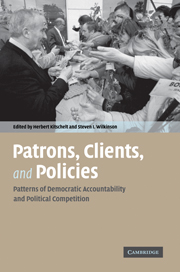Book contents
- Frontmatter
- Contents
- List of figures
- List of tables
- Acknowledgments
- List of contributors
- 1 Citizen–politician linkages: an introduction
- 2 Meet the new boss, same as the old boss? The evolution of political clientelism in Africa
- 3 Monopoly and monitoring: an approach to political clientelism
- 4 Counting heads: a theory of voter and elite behavior in patronage democracies
- 5 Explaining changing patterns of party–voter linkages in India
- 6 Politics in the middle: mediating relationships between the citizens and the state in rural North India
- 7 Rethinking economics and institutions: the voter's dilemma and democratic accountability
- 8 Clientelism and portfolio diversification: a model of electoral investment with applications to Mexico
- 9 From populism to clientelism? The transformation of labor-based party linkages in Latin America
- 10 Correlates of clientelism: political economy, politicized ethnicity, and post-communist transition
- 11 Political institutions and linkage strategies
- 12 Clientelism in Japan: the importance and limits of institutional explanations
- 13 The demise of clientelism in affluent capitalist democracies
- 14 A research agenda for the study of citizen–politician linkages and democratic accountability
- References
- Index
1 - Citizen–politician linkages: an introduction
Published online by Cambridge University Press: 27 October 2009
- Frontmatter
- Contents
- List of figures
- List of tables
- Acknowledgments
- List of contributors
- 1 Citizen–politician linkages: an introduction
- 2 Meet the new boss, same as the old boss? The evolution of political clientelism in Africa
- 3 Monopoly and monitoring: an approach to political clientelism
- 4 Counting heads: a theory of voter and elite behavior in patronage democracies
- 5 Explaining changing patterns of party–voter linkages in India
- 6 Politics in the middle: mediating relationships between the citizens and the state in rural North India
- 7 Rethinking economics and institutions: the voter's dilemma and democratic accountability
- 8 Clientelism and portfolio diversification: a model of electoral investment with applications to Mexico
- 9 From populism to clientelism? The transformation of labor-based party linkages in Latin America
- 10 Correlates of clientelism: political economy, politicized ethnicity, and post-communist transition
- 11 Political institutions and linkage strategies
- 12 Clientelism in Japan: the importance and limits of institutional explanations
- 13 The demise of clientelism in affluent capitalist democracies
- 14 A research agenda for the study of citizen–politician linkages and democratic accountability
- References
- Index
Summary
Since the 1970s, the “Third Wave” of democratic transitions has, by greatly enlarging the number and type of democracies, raised a host of new research questions on the dynamics of democratic accountability and responsiveness. After an initial period of scholarly attention to the process of regime transition, there has recently been a major effort to explain the origin and effects of democratic institutions, such as electoral laws, federalism structure, or presidential and parliamentary systems. After more than a decade's worth of research, however, it now seems that the explanatory power of formal democratic institutions for democratic process features is more limited than many had hoped. Party systems vary tremendously even among single member district plurality electoral systems. Furthermore, institutional arguments have little to say about the substantive alignments that rally citizens around rival contenders or the strategic appeals made by leading politicians in each camp.
One important area that has not received sufficient attention is the wide variation in patterns of linkages between politicians, parties and citizens. The political science literature has, since the 1950s, been dominated by the “responsible party government” model, the logic of which forms the basis of both rational choice theories (Downs 1957) as well as historical-comparative approaches (e.g., Lipset and Rokkan 1967). This model sees politics as the result of interaction of principals (citizens, voters) and agents (candidates for electoral office, elected officials), characterized by five essential ingredients.
- Type
- Chapter
- Information
- Patrons, Clients and PoliciesPatterns of Democratic Accountability and Political Competition, pp. 1 - 49Publisher: Cambridge University PressPrint publication year: 2007
- 152
- Cited by



